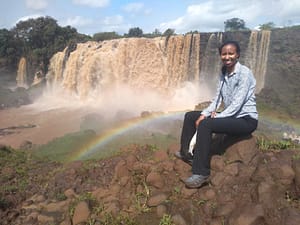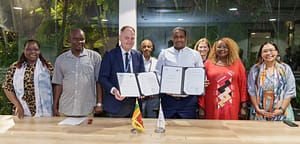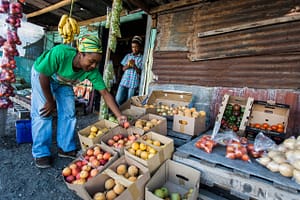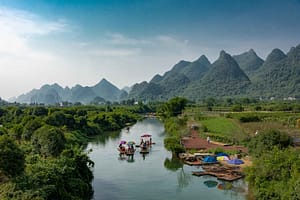To mitigate the negative effects of urbanization on resource use and environmental pollution, 15 key actors in the waste-sanitation-agriculture interface joined efforts to set up a Circular Bioeconomy Innovation Hub in Ghana. Based on a decade of CGIAR research, the hub links ministries, universities, science, and private sector, to offer their infrastructure and knowledge for building capacity in circular bio-solutions for school students to professionals. Using co-ownership principles, the hub builds on jointly defined objectives and workplans.
The challenges of increasing urbanization in terms of food security and resource use, governance and adequate waste management are growing with the urban populations. How can the negative urban footprint be mitigated? How can we reduce food waste and safeguard the peri-urban environment? In response, the CGIAR Initiative on Resilient Cities in collaboration with the CGIAR Initiative on Nature Positive Solutions has facilitated a Circular Bioeconomy Innovation Hub in Ghana linking key stakeholders from the public and private sector, research, and education. Under the leadership of the International Water Management Institute (IWMI), the innovation hub builds on a decade of CGIAR research on resource recovery and reuse (RRR) from technology development to business modelling, the implementation of Public-Private Partnerships and commercialization of recovered resources. The hub can showcase e.g., how organic waste is transformed into safe compost and co-compost (with fecal sludge), dry fuel (briquettes), biochar or biogas, or how aquaculture can be a thriving business in symbiosis with wastewater treatment plants.
Knowledge sharing ranges from hands-on training in biomass transformation and valorization, business development, the analysis of the enabling environment, demand exploration and marketing. The capacity building program is not only targeting young professionals of Micro-, Small-, and Medium-sized Enterprises (MSMEs), but also the public sector and has programs for schools looking at what households can contribute to a Circular Bio-Economy.
To ensure broad buy-in for a sustainable implementation and to increase its outreach, the Hub is running on co-ownership principles. Based on a scoping and screening exercises involving 24 key stakeholders from various sectors, so far 15 organizations formally accepted to co-convene the hub, by adding their resources and/or using it for capacity development. These organizations are from public institutions (e.g., Ministry of Sanitation and Water Resources, Ministry of Food and Agriculture), private organizations/MSMEs (e.g., Clean Team, Safisana, Jekora Ventures Limited, MDF Training & Consultancy), NGOs (e.g. Catholic Relief Services), two university-based centers (Regional Water and Environmental Sanitation Center, Kumasi), Institute for Environment and Sanitation Studies, Accra) and international research organizations (International Fertilizer Development Center and IWMI). The creation of this platform of co-convenors allows to link efforts of key organizations in the promotion of practical examples on how to implement and scale circular bio-economy options in a local or regional context. The approach links demand (agriculture) and supply (waste management) and moves away from the overly technical focus of most circular initiatives. Compared to other training initiatives, the Hub is able to support accompanying research for all its components, from optimizing co-composting processes to cropping trials with different waste-derived soil fertility enhancing resources.
First spillovers are emerging:
- Ghana’s Ministry of Environment, Science, Technology, and Innovation (MESTI), has invited IWMI to represent the Hub in its Ghana Commercialization Partnership Program which facilitates collaboration, co-creation, and resource mobilization for the commercialization of research and innovation in the country, linking the Hub to key players like GIZ, European Union, World Bank, local embassies, etc.
- Sri Lanka’s Waste Management Authority asked IWMI to join them as knowledge partner in establishing a second Innovation Hub in Sri Lanka where the authority is starting an officially accredited vocational training center at a compost and recycling station.
Currently, all training materials are being finalised. The hub has a particular youth focus, targeting Basic schools, Junior high schools and Senior high schools. It is envisaged that the first sets of trainings start from mid-July. For this, another workshop is planned with the hub co-convenors to consolidate expectations, commitments, and finalize the discussion on the hub’s operational structure and workplan for its official launch.
For information on the Hub, contact: Ms. Dzifa Agbefu (d.agbefu@cgiar.org), Innovation Hub Coordinator, IWMI -Ghana







